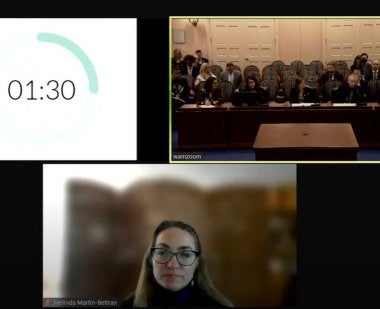
More than 90,000 multilingual English learners attend schools in the state of Maryland, according to the Maryland State Department of Education. Dual language programs—in which both multilingual English learners and primary English speakers learn academic content in both English and another language—help students cultivate strengths and position them for success. Although dual language programs are on the rise in Maryland, these programs face a shortage of qualified bilingual teachers. In fact, Maryland is one of 24 states that does not have a bilingual or dual language teacher certification program.
On January 24, experts from the Department of Teaching and Learning, Policy and Leadership (TLPL) at the University of Maryland College of Education testified before the Ways and Means Committee of the Maryland House of Delegates, in support of House Bill 56: Dual Language Education—Teacher Certification, Program Implementation and Study. The researchers had worked with Delegate Lorig Charkoudian’s office to develop the bill, which would help establish regulations for dual language teacher certification, as well as guidelines for implementing dual language programs in public schools. The bill would also help meet the Blueprint for Maryland’s Future: Workgroup on English Learners’ recommendations to train more bilingual teachers and expand dual language programs across the state.
“We believe that in order to have bilingual schools, we need to adequately prepare dual language teachers. This [bill] would be the legal framework that the state needs to propose, validate and support bilingual education,” said Assistant Clinical Professor Alejandro Pérez-Belda in his testimony before the committee.
“No great instructional model can generate the anticipated learning outcomes for any student populations if it’s not implemented by well-prepared teachers,” added Nihat Polat, TLPL department chair, in the written testimony he submitted to the committee.
Dual language programs need teachers who have been properly trained in multiple areas, including additional language acquisition and teaching, as well as the grade levels, content areas and languages they teach. House Bill 56 would allow colleges and universities in Maryland to develop certification programs to prepare teachers to develop the skills and knowledge to effectively implement dual language programs and bilingual education before they enter the classroom.
TLPL has already created a bilingual certification program that is ready to launch and will draw upon the department’s many resources and strengths in this area. The department is home to national leaders in multilingual education and research, the Multilingual Research Center and a world-class doctoral program in applied linguistics.
At the bill hearing, University of Maryland experts—including Pérez-Belda, Associate Clinical Professor and TESOL Program Coordinator Drew S. Fagan, Ph.D. Student and Research Assistant Sandra Gutiérrez, and Associate Professor Melinda Martin-Beltrán—spoke to the committee about the benefits of dual language programs and bilingual education. Research shows that students who are highly proficient in two languages score higher on standardized tests in both languages, have greater cognitive flexibility, are more empathetic and culturally competent, and are more successful in college and the workforce. Dual language programs lead to better outcomes in academic achievement, graduation rates and attitudes toward school among both multilingual English learners and primary English speakers, but they offer particular value for multilingual English learners. Through dual language programs, multilingual English learners gain the opportunity to preserve their first language and culture. In addition, research has shown that people who are more proficient and literate in their first language can more easily learn a second language.
“Research shows that bilingual education is a powerful way to transform students’ lives,” said Gutiérrez in her testimony. “In short, bilingualism opens doors.”
“Dual language certification is a clear and proven way to meet English learners’ needs [and] would help ensure that all Maryland’s children succeed,” Fagan testified.
“On behalf of our multilingual children, our teachers and teacher educators, I urge you to seize this opportunity to strengthen education for the future of multilingual Maryland,” Martin-Beltrán told the committee.



